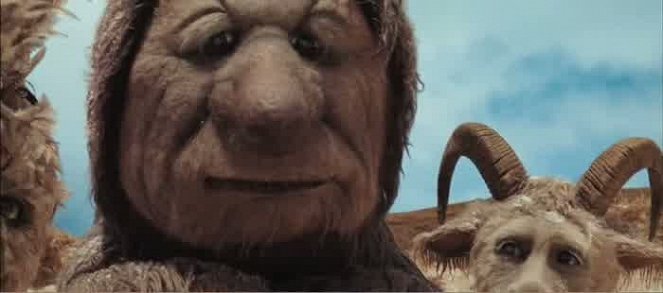Regie:
Spike JonzeKamera:
Lance AcordBesetzung:
Max Records, Ryan Corr, Catherine O'Hara, Forest Whitaker, Paul Dano, Catherine Keener, James Gandolfini, Lauren Ambrose, Tom Noonan, Alice Parkinson (mehr)Streaming (4)
Inhalte(1)
Der neunjährige Max läuft von zu Hause fort und segelt übers Meer, um im wunderbaren Reich der gigantischen Zottelmonster König zu werden – doch es ist gar nicht so einfach, ein König zu sein! Filmemacher Spike Jonze inszeniert die zauberhafte, optisch überwältigende Kinoversion des gefeierten Buchklassikers von Maurice Sendak über die lustigen und wilden Krawallzeiten, die wir Kindheit nennen. (Warner Bros. DE)
(mehr)Kritiken (6)
I want to read the book because I’m interested in how the narrative is constructed and more importantly what it is about! The film version is a whiny hodgepodge of nothing about a pissed-off brat who deserves two "educations" right off the bat. It is better not to worry about the (non)plot and not to look for the final measure on the scale with the word "weird."
()
It’s a Spike Jonze movie, so nothing normal to be found here. However, try as I might, I couldn’t find my way into Max’s way of thinking and into these monsters that were swaying around him. They were strangely cute, but that was probably the only thing that was nice about them. And as I was nearing the end minute by minute, I actually realized that I couldn’t find anything else that would deserve the label – weird, but good.
()
Der Fratz hätte nach fünf Minuten Prügel und Hausarrest bekommen sollen. Nach einer halben Stunde habe ich den Film ausgemacht und wütend gelöscht, weil mich das behinderte Brüllen und Schreien fürchterlich gestört hat.
()
The trailer for the film is a more faithful adaptation of the original in both mood and scope. Of course, I understand that the scope of Sendak's original is a limiting handicap when attempting a feature film adaptation.
()
Where the Wild Things Are is a grandiose film adaptation of the picture book of the same name by Maurice Sendak, which ranks among the classic works of English literature for children. Whereas Milne’s internationally acclaimed Winnie the Pooh is based on the character of an external adult narrator who tells Christopher Robin stories in which the latter’s toys and animals from the area take on distinctive personalities, Sendak provides direct insight into the minds and imaginations of children. This does not take the form of colourful imbecility, which many creators of children’s books and films imagine under the combined banner of childhood and fantasy, as it shows the qualities of children that are usually absent in other works due to idealisation – uncontrollability, capriciousness, sulkiness, self-centredness and the need for constant attention from others and a supply of new stimuli to amuse them. The film adaptation, directed by Spike Jonze, required expansion of the 27-page book in order for it to work as a feature-length film. Therefore, greater focus was placed on the characters in a fantasy world similar to that of the Winnie the Pooh stories. Sendak’s story about a young boy who, after a quarrel with his mother, runs away into a fantasy world where he becomes the king of scary wild creatures showed fantasy purely as a space that is literally subject to the whims of the hero. Jonze and co-screenwriter Dave Eggers gave the originally nameless creatures distinctly individual personalities that mirror different parts of the boy’s own personality and the attitudes of the people around him. Paradoxically, the space to which the boy has run away from the outside world becomes a place where he is confronted with himself and how he treats others and how others treat him. The film thus gently introduces into the original narrative about childhood elements of adolescence as a phase of life when we begin to realise that we are part of a society in which we have a certain position and that we must subordinate our behaviour to our relationships with other people. Thanks to that, the film is not just another naïve “celebration of children’s imagination”, but rather an accurate view of childhood, which, like the wilderness portrayed in the film, contains affection, danger, merriment, anxiety, creative joy and self-indulgent destructiveness.
()
A film not only about human imagination but also about how we treat nature, living organisms, people, and each other. Lying is so close to us that we almost do it automatically, and then we may even pay the consequences for it. Sometimes better, sometimes worse, like the main character in this film, where the most interesting aspect is the monsters.
()

